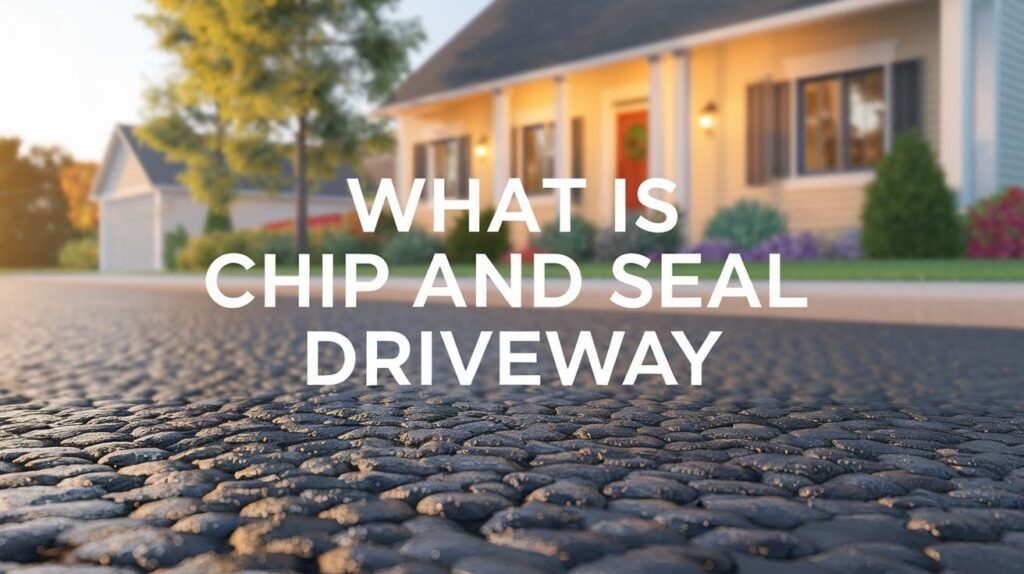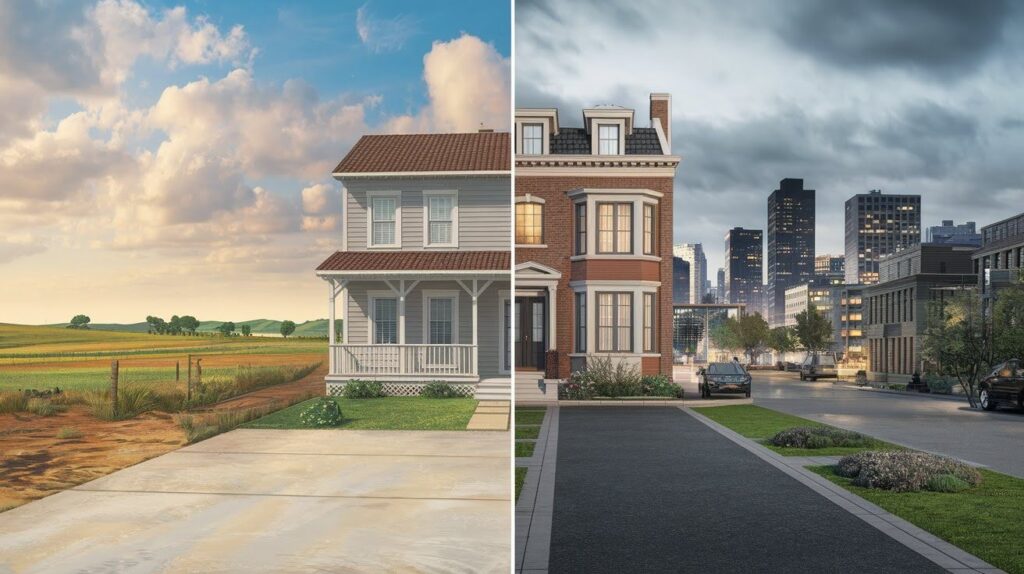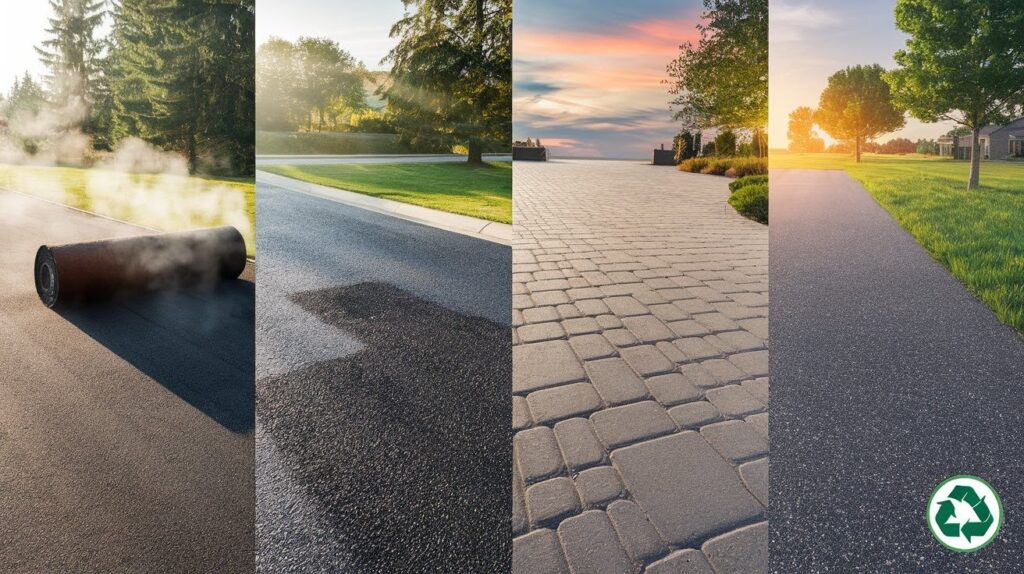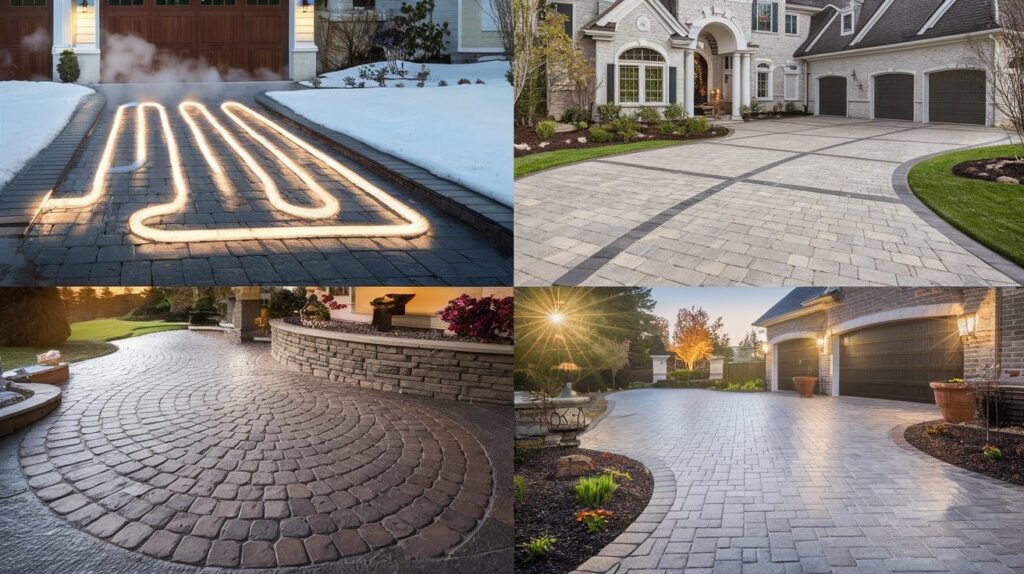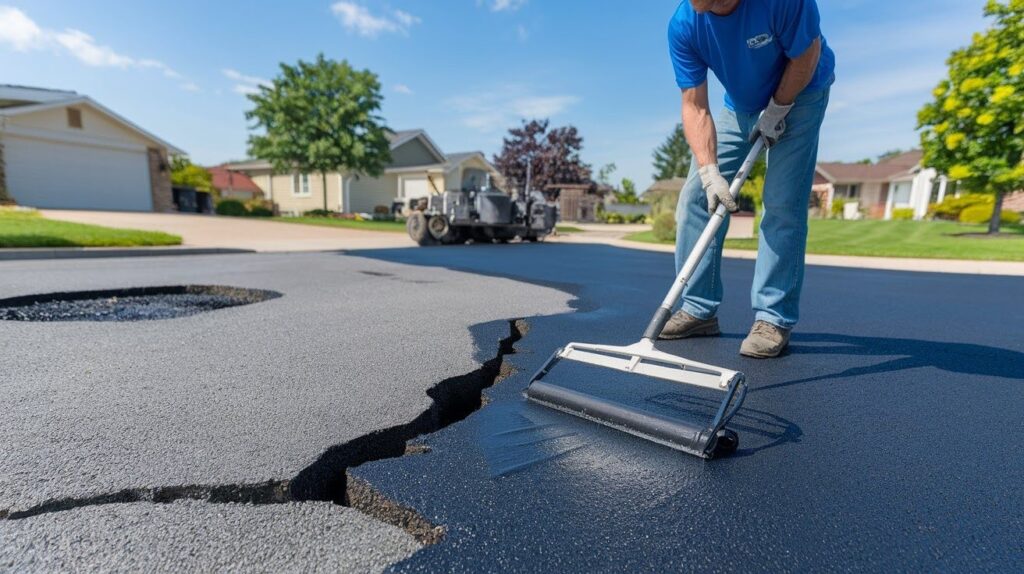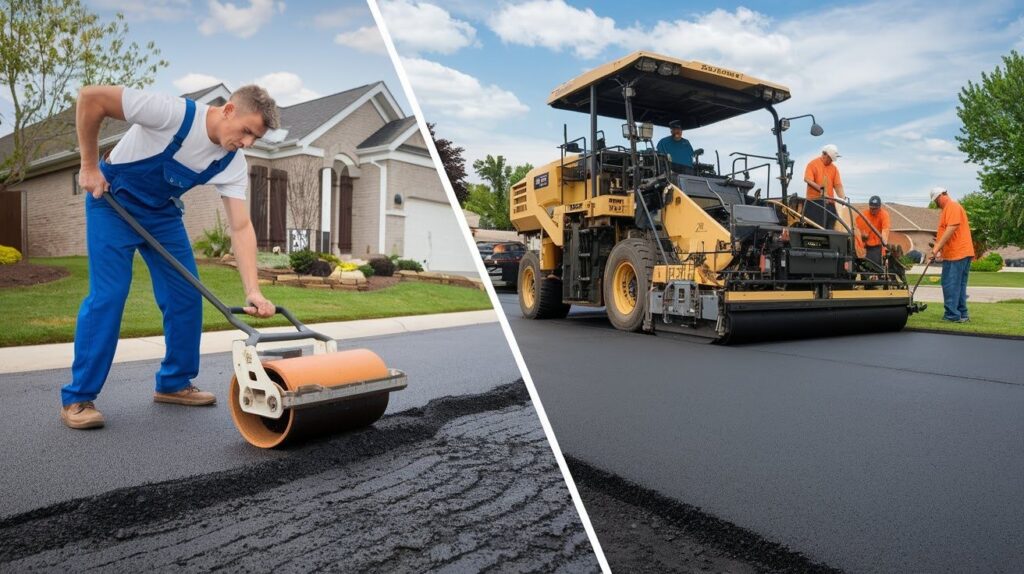Planning a new driveway? You’re probably wondering how much it’ll cost you. I get it – asphalt driveways are everywhere for good reason. They’re durable, look great, and won’t break the bank like other materials.
Here’s the thing: nationally, you’re looking at anywhere from $3 to $7 per square foot. But that’s just the starting point.
I’ve spent years in the construction industry, and I know how confusing pricing can get. That’s why I’m breaking down every cost factor that affects your final bill. From materials to labor to those sneaky extras contractors don’t always mention upfront.
In this article, I’ll walk you through real numbers, hidden costs, and smart ways to save money. By the end, you’ll know exactly what to budget and how to avoid overpaying.
Factors That Influence Asphalt Driveway Costs
Your driveway cost isn’t just about square footage – several key factors can swing your price up or down by thousands.
1. Location and Regional Variations
Where you live makes a huge difference in what you’ll pay.
I’ve seen the same driveway cost $4,000 in rural Texas and $8,000 in downtown Boston. Urban areas always cost more because of higher labor rates and material transport costs. Plus, if you’re in a cold climate like Minnesota, you’ll need thicker asphalt to handle freeze-thaw cycles. That adds about $1-2 per square foot right there.
Here’s what I typically see: Northeast runs $5-7 per square foot, while Southern states hover around $3-5 per square foot.
2. Driveway Size and Thickness
Bigger driveways cost more, but you get better per-square-foot pricing on large jobs.
Most homes need 4 inches of asphalt. But if you park heavy trucks or RVs, go with 5-6 inches. That extra thickness costs about 25% more but prevents cracking down the road. A 500-square-foot driveway at 4 inches might run $2,000, while the same size at 6 inches hits $2,500.
3. Type of Asphalt
Not all asphalt is created equal, and your choice affects both upfront cost and longevity.
Hot mix asphalt is the gold standard – it’s what I recommend for most driveways. Cold mix is cheaper upfront but won’t last as long. Want something special? Stamped asphalt looks like brick or stone but costs 3x more. Recycled asphalt saves you about 20-30% and is environmentally friendly.
4. Additional Features
These upgrades can turn a basic driveway into something special, but they come with a price tag.
Heated driveway systems cost $11-24 per square foot but eliminate snow shoveling forever. Stamped designs run $12-17 per square foot and give you that high-end look. Custom borders, curves, or decorative edges add another $3-5 per linear foot.
Asphalt vs. Other Driveway Materials
Let me show you how asphalt stacks up against your other options so you can make the right choice for your budget.
Concrete Driveways
Concrete costs $3-18 per square foot, depending on finishes and thickness.
I install both asphalt and concrete, and here’s the truth: concrete lasts longer but costs more upfront. A basic concrete driveway runs about the same as asphalt, but decorative concrete gets expensive fast. Concrete handles heavy loads better and stays cooler in summer. The downside? It cracks in cold climates and costs twice as much to repair when it does.
Gravel Driveways
Gravel is the budget option at $1-3 per square foot for initial installation.
Sure, gravel saves you money upfront. But I tell my clients to think long-term. You’ll spend $200-500 every few years adding fresh gravel and grading. Plus, snow removal is a nightmare, and your car tracks stones everywhere. If you’re on a tight budget and have a long rural driveway, gravel makes sense. Otherwise, save up for asphalt.
Brick Driveways
Brick pavers cost $10-30 per square foot and look absolutely gorgeous.
I love the way brick driveways look, but most homeowners can’t justify the cost. You’re looking at 3-5 times more than asphalt for the same space. Brick also requires regular maintenance to keep weeds out and pavers level. If money isn’t an issue and you want maximum curb appeal, go for it. But for most families, asphalt gives you 80% of the look at 30% of the cost.
Maintenance and Long-Term Costs
Your asphalt driveway isn’t a set-it-and-forget-it investment – here’s what you’ll spend to keep it looking good for decades.
Sealing
Plan to seal your driveway every 3-5 years to protect it from weather and extend its life.
I always tell homeowners that sealing is like sunscreen for your driveway. Basic coal tar sealer costs about $0.08-0.15 per square foot if you do it yourself. Professional-grade acrylic sealers run $0.20-0.50 per square foot but last longer and look better. For a typical 600-square-foot driveway, you’re looking at $120-300 every few years. Skip this step and you’ll pay much more later.
Repairs
Small fixes now prevent big headaches later, and the costs are pretty reasonable.
Crack filling is your cheapest repair at $1-3 per linear foot. I can usually fill 50 feet of cracks in an hour. Potholes are trickier and cost $100-500 depending on size and depth. The newest option is infrared repair at $2-6 per square foot. It heats and remixes existing asphalt, creating a seamless fix that lasts longer than traditional patches.
Resurfacing vs. Replacement
Knowing when to resurface versus replace can save you thousands of dollars.
If your driveway has minor cracking and surface wear but the base is solid, resurfacing works great. It costs about half of full replacement and adds 8-12 years of life. But if you have major settling, deep cracks, or drainage issues, bite the bullet and replace it. I’ve seen too many homeowners waste money on resurfacing when the foundation was shot. A good contractor will tell you honestly which option makes sense.
DIY vs. Hiring a Professional
Before you grab a shovel and try to save money, let me walk you through what DIY really involves and when it makes sense to call the pros.
DIY Cost Savings and Challenges
You can save on labor costs, but asphalt installation comes with some serious hurdles most homeowners don’t expect.
Labor typically runs 40-60% of your total cost, so the savings look tempting. But here’s what I see DIYers struggle with: renting a steamroller costs $300-500 per day, and you need it for proper compaction. Getting hot asphalt delivered requires timing everything perfectly – it cools fast and becomes useless. I’ve watched weekend warriors end up with wavy, poorly compacted driveways that crack within two years. The material savings disappear when you have to redo the whole thing.
Benefits of Hiring Professionals
Professional installation gives you expertise, proper equipment, and peace of mind that’s hard to put a price on.
We bring industrial rollers, skilled crews, and years of experience reading soil conditions and drainage patterns. Most contractors offer 2-5 year warranties on workmanship – something you can’t get with DIY. Plus, we’re insured if something goes wrong. I’ve fixed countless DIY disasters over the years, and the homeowners always wish they’d hired a pro from the start. The extra cost upfront usually saves money in the long run.
Tips
- Get multiple quotes – Prices vary widely between contractors, so compare at least 3 estimates
- Time it right – Schedule installation in late spring or early fall for best weather conditions
- Check the base – Proper grading and base preparation prevent 90% of future problems
- Go thicker in cold climates – Invest in 5-6 inches if you live where it freezes regularly
- Seal within 6 months – New asphalt needs its first seal coat before the first winter
- Don’t park heavy vehicles – Keep RVs and delivery trucks off fresh asphalt for 48 hours
- Fix cracks early – Small repairs cost $1-3 per foot vs. thousands for full replacement
- Ask about warranties – Good contractors back their work for 2-5 years
- Verify licensing and insurance – Protect yourself from liability and poor workmanship
- Consider recycled asphalt – Save 20-30% on materials while helping the environment
- Plan for maintenance costs – Budget $200-400 every 3-5 years for sealing
- Avoid the lowest bid – Cheap contractors often cut corners on materials and prep work
Conclusion
Now you know the real numbers: asphalt driveways typically cost $3-7 per square foot, but your final price depends on location, thickness, and features you choose.
Don’t just look at the upfront cost. Factor in sealing every 3-5 years, occasional repairs, and potential resurfacing down the road. A cheaper installation that fails in 5 years costs more than quality work that lasts 20.
My advice? Find the sweet spot between your budget and quality. Get multiple quotes, verify credentials, and don’t automatically pick the cheapest bid. A well-installed asphalt driveway from a reputable contractor will serve you well for decades and boost your home’s value.
Remember, this isn’t just about getting from the street to your garage. It’s an investment in your property that you’ll use every single day.
Frequently Asked Questions
How long does an asphalt driveway last?
A properly installed asphalt driveway typically lasts 15-20 years with regular maintenance. Cold climates and heavy use can reduce this to 12-15 years, while warmer areas with lighter traffic often see 20-25 years.
Can I install asphalt over my existing driveway?
Yes, you can overlay asphalt on concrete or old asphalt if the base is in good condition. However, if there are major cracks, settling, or drainage issues, full removal and replacement works better long-term.
What’s the best time of year to install an asphalt driveway?
Late spring through early fall offers ideal conditions when temperatures stay above 50°F consistently. Avoid winter installation as cold weather prevents proper compaction and can cause premature cracking.
How soon can I drive on my new asphalt driveway?
You can walk on it immediately, but wait 24-48 hours before driving cars on it. For heavy vehicles like moving trucks or RVs, wait at least 7 days to prevent permanent tire marks and damage.
Do I need permits for an asphalt driveway installation?
Most areas require permits for new driveways or major replacements, especially if you’re changing the size or drainage. Check with your local building department before starting, as unpermitted work can
cause issues when selling your home.

